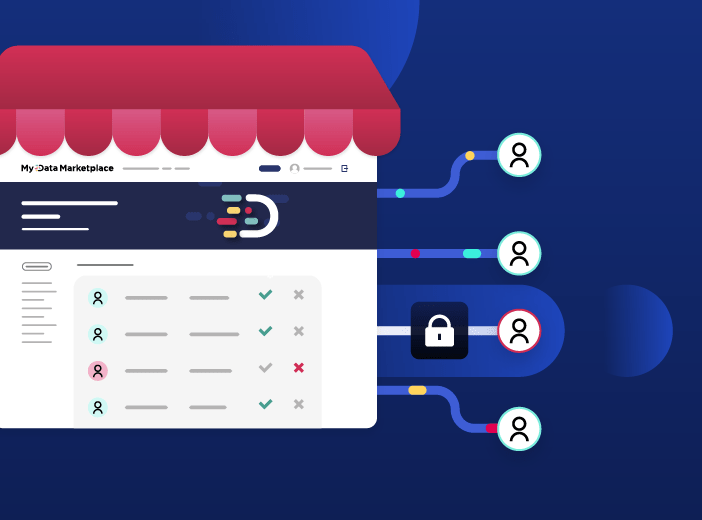Turning data into value through open data, self-service and data services

Successfully harnessing data delivers transformative benefits to organizations, their customers and wider ecosystems. We explore three key usages - open data, self-service and data services and explain how they enable competitive advantage, greater efficiency, higher transparency and more powerful innovation.
Data is an essential part of how every organization now needs to operate. It is central to digital transformation and ensures both businesses and the public sector are run more efficiently, transparently and collaboratively. Employees can make better informed decisions, customers and citizens have a clear view of your activities, while partners and other stakeholders can work with you – and your data – to create innovative solutions that provide real value.
Delivering these benefits relies on data democratization – making information easily available to everyone, whatever their technical skills, in ways that they can understand and act on. We explained more about data democratization as a concept and the challenges that hold back its adoption in this blog. In this article we aim to focus on three key use cases around increased data usage (open data, self-service data and data services) that benefit you and your ecosystem.
Opening your data to your ecosystem
Today consumers and citizens expect full transparency from the organizations they deal with, across both the public and private sectors. They want to be able to see how you are performing against your key performance indicators (such as around the speed of responding to a police call-out request) and why you have made specific decisions that affect their lives.
As well as service quality, consumers are more and more interested in the societal impact of your activities – such as around sustainability, emissions, and diversity. They will judge your brand on how you are performing against these criteria, affecting loyalty and revenues.
It is vital that all of this data is not just available openly, but can be accessed by non-specialists in forms that they understand. That means easy to view data experiences such as dashboards, maps and visualizations available via your website and apps, along with powerful APIs that allow developers and other stakeholders to build on your data in new ways.
The benefits of opening data
Making data available across your ecosystem delivers key benefits:
- It strengthens your reputation with customers, consumers and citizens
- It builds trust in your activities and for public sector organizations justifies your decision making
- It wins new customers and partners by demonstrating a transparent approach in tune with their aspirations
- It encourages innovation across your ecosystem
- It attracts and retains talent who want to work for open, purpose-driven organizations that make a difference
Effectively share data internally through self-service
Organizations are home to ever increasing volumes of data. Whether generated by IT systems, production equipment, customer-facing websites or Internet of Things sensors, harnessing this information is key to digitizing operations and gaining competitive advantage.
However, often this data is scattered across the organization in silos, and it is difficult for those that would gain most benefit to actually find it. Quality can be variable, and a lack of metadata makes it hard to understand exactly what the data itself covers. Access is restricted to experts who have the technical skills to understand and manipulate it effectively.
Overcoming these challenges requires organizations to bring together all of this data and make it available to every employee, through self-service portals that centralize access and make data information understandable to those without specialist skills. That way employees can quickly use and consume the data they need to do their jobs better, without having to rely on specialists to prepare it for them.
The benefits of self-service data
Introducing a self-service data portal within the organization drives competitive advantage in multiple ways:
- Organizations can be more responsive and agile in how they operate on a day-to-day basis, especially when it comes to monitoring and acting on real-time information, such as production processes, emissions monitoring or smart city metrics
- By enabling employees to create their own data experiences, such as dashboards and visualizations, you build a modern, agile and data-driven organization
- It creates a company-wide data culture that puts information, sharing and openness at the heart of the organization
- Decision making is accelerated and improved through faster access to the right information for all
- Efficiency increases as employees no longer need to wait for reports and data to be prepared by others, freeing up resources and allowing process improvements
Creating new data services
Data use shouldn’t stop at the walls of your organization. Sharing data in a tailored way with partners further increases its value to the ecosystem and can open new revenue streams. For the public sector creating data services helps citizens, partners and collaborators to better understand key topics and themes, increasing engagement, innovation and transparency.
Essentially organizations have to do their data management groundwork first before launching data services – so collecting, cleaning and organizing their information before they make it available, particularly if they are charging for these services. Key to user adoption is an agile, test and learn approach that quickly builds pilot services, trials them with users, and then improves the offering to drive increased take-up.
The benefits of data services
In a world driven by information, creating data services delivers a range of benefits:
- It increases customer and partner retention by adding value to their experience and providing deeper insights that improve their own performance
- It increases your own productivity and efficiency, such as by automating the delivery of data reports that previously had to be created and provided manually
- It makes your public sector organization more attractive and open to stakeholders such as citizens and partners
- It opens up new revenue opportunities built on data that you can sell alongside other services and physical products
- It underpins greater collaboration and innovation within your ecosystem
Birdz, part of Veolia, is a leader in environmental Internet of Things sensors for cities and utilities, with 3.4 million connected devices and 350 million pieces of data collected each day. Services are a key part of its offering:
Best practice in data democratization
For all three of these usages, organizations need to follow these key best practices, which span culture, technology and processes:
- Start with data quality and governance. The data you are sharing must be reliable, high-quality, up-to-date, and meet regulations around privacy and confidentiality.
- Ensure data meets the needs of users. This means listening to their requirements and providing data in the right formats to deliver on them.
- Make data accessible through intuitive experiences. Data must be easy to consume and use by non-specialists, so work with a tool that enables everyone to access, share and consume data without requiring technical skills.
- Become data-driven. Break down barriers and remove concerns by building a data culture within your organization and ecosystem that is confident in using data in all their activities.
How democratizing data delivers new opportunities
We live in an increasingly data-driven and digital world. This is transforming the possibilities for organizations in how they operate, collaborate with stakeholders and innovate for the future. Harnessing data and democratizing it effectively through open data, self-service portals and new data services is therefore critical to increasing transparency, building stronger relationships and unlocking new revenue opportunities moving forward.

Data contracts are key to building trust in data in distributed environments, and are at the heart of data products. We look at how to build and enforce data contracts through a data product marketplace to unlock greater value from data.

It can be hard to understand exactly what a data product is, given the many ways that the term is defined and applied. To provide clarity this article provides a business-focused definition of a data product, centered on how it makes data accessible and usable by the wider organization, while creating long-term business value.


